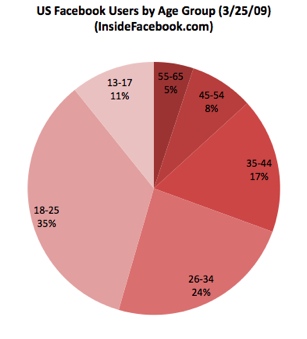The Culture of Facebook
“But the more interesting question is whether this will mean any change in the culture of Facebook – always assuming that it has any discernible culture.”
An interesting question raised in an otherwise somewhat flip article in the Guardian, commenting on the news that most Facebook users are over 25 and the fastest growing demographic group on Facebook are woman over 55, according to new research from Inside Facebook. (The article is curious, the author appears unsure as to whether a newspaper of the Guardian’s perceived gravitas should report seriously on the demographic makeup of Facebook users).
One thing this research does confirm, once again, is the misleading nature of terms like the ‘Net Generation; and ‘Digital Natives’.
But does Facebook have a discernible culture? No, I would say, Facebook is merely a social networking platform. But of course communities if users develop culture. And our use of adoption and use of tools and media help shape our cultures. Social networks are hardly new. it is just that digital platforms and tools allow the development of distributed networks – over space and time – and allow the sharing and of artefacts developed as part of that culture. witness the way Blip.fm (yes I know I keep going on about it) allows us to develop networks and communities around music.
According to Wenger (1998), a community of practice defines itself along three dimensions:
- What it is about – its joint enterprise as understood and continually renegotiated by its members.
- How it functions – mutual engagement that bind members together into a social entity.
- What capability it has produced – the shared repertoire of communal resources (routines, sensibilities, artefacts, vocabulary, styles, etc.) that members have developed over time. (see, also Wenger 1999: 73-84).
Most communities on Facebook or Blip.fm are not communities of practice as defined by Wenger. They might better be defined as communities of interest. But they do show features of the different dimensions identified by Wenger especially in terms of capability and that capability is in turn mediated by tools in the form of affordances. And yes, of course communities have cultures!
References
Wenger, E. (1998) ‘Communities of Practice. Learning as a social system’, Systems Thinker, http://www.co-i-l.com/coil/knowledge-garden/cop/lss.shtml. Accessed March 27, 2009.
Wenger E 1999, Communities of Practice. Learning, meaning and identity, Cambridge: Cambridge University Press

